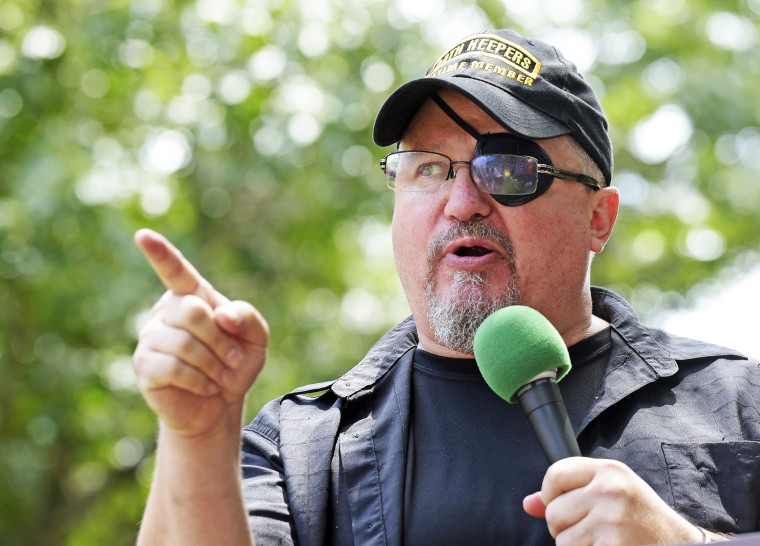WASHINGTON — Federal prosecutors rested their case against Oath Keepers founder Stewart Rhodes and four other members of the far-right organization Wednesday without calling three cooperating defendants who pleaded guilty to seditious conspiracy.
Opening arguments in the trial began Oct. 3, and over five weeks of testimony, jurors heard from two Oath Keepers — Jason Dolan and Graydon Young — who pleaded guilty in connection with the Jan. 6 attack on the U.S. Capitol. Dolan testified that he hoped to scare members of Congress and that he was part of a group that “would be willing to fight” to keep former President Donald Trump in office. Young testified that he was “acting like a traitor” on Jan. 6, 2021, and that he thought he was part of an event similar to the 1789 storming of the Bastille during the French Revolution.
But the government did not call three members of the group who pleaded guilty to seditious conspiracy — Joshua James, Brian Ulrich and William Todd Wilson — before it rested its case.
The defense is likely to begin presenting its case, which is expected to include testimony from Rhodes, on Thursday before each side makes its closing arguments and the case goes to the jury.
Rhodes, along with Kelly Meggs, Kenneth Harrelson, Jessica Watkins and Thomas Caldwell, are on trial in connection with allegations of a criminal conspiracy that the government says involved Oath Keepers’ invading the U.S. Capitol in military stack formations and stockpiling weapons for a “quick reaction force” at a Virginia hotel just outside Washington. Another Oath Keeper who did not plead guilty to any crime, Terry Cummings, testified that the "QRF" had more guns than he'd seen in one place since he was in the military.
The government’s case featured a lot of direct evidence of discussion about plans to use force to oppose the transition of power but not a lot of explicit evidence that the Oath Keepers planned to storm the Capitol. Young testified that there was an "implicit" agreement to storm the Capitol when the opportunity presented itself.

Prosecutors may have decided that presenting any of the three defendants who pleaded guilty to seditious conspiracy would be too big a risk on cross-examination. Glenn Kirschner, a NBC News legal analyst who has sat through much of the trial, said cooperating defendants can be "notoriously difficult to polish up" and make palatable to jurors. Jurors could be troubled by the actions of cooperating witnesses and have trouble crediting their testimony.
"You never want to be perceived as being aligned with or excusing or unduly forgiving horrific crimes, and that's a risk you run when you put a cooperating witness on the stand," Kirschner said. Prosecutors also can't explicitly argue that because witnesses pleaded guilty to seditious conspiracy that the defendants are guilty of the same charge, which limits the value of their testimony.
"I have to believe that they don't feel the need to put some really compromised human beings on the stand to try to convict these defendants," Kirschner said. "They obviously believe they've presented enough evidence to convince the jurors without the testimony of these cooperating witnesses."
Rhodes, in evidence prosecutors introduced Wednesday, wrote a message to Trump on Jan. 10, 2021, asking him to invoke the Insurrection Act and use the Oath Keepers to stay in power. (Although Rhodes thought the message would be delivered to Trump, it never was.) Rhodes also, in a recording the same day, said that they "should have brought rifles" on Jan. 6 and that he'd "hang f---in’ Pelosi from the lamppost."
Lawyers for the defendants will now present their case. Defense attorneys have suggested that members of the Oath Keepers assisted law enforcement on Jan. 6, but Capitol Police Officer Harry Dunn testified that wasn't the case for the Oath Keepers he encountered outside House Speaker Nancy Pelosi's office.
